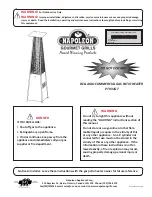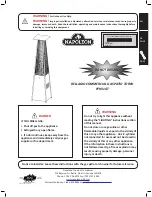
SCALDING HAZARD
. If the water temperature is
over 120°F, household members can suffer serious
or fatal scalding and painful and permanent injury. • The Consumer
Products Safety Commission recommends an initial setting of 120°F, but
advised that a slower response time of infants, aged, disabled and other
persons increases the scalding hazard and may require lower settings. •
Always check the water temperature before use, including washing,
bathing or showering. • Temperature limiting valves are available from your
plumbing supplier. A check valve must be installed in the boiler return line
to prevent gravity flow through the heat exchanger. This can cause
overheating and result in serious or fatal scalding.
SCALDING HAZARD.
If the thermostat is not
working properly or if this product is not installed in
accordance with the manual, water temperature can reach excessive levels
that may cause serious or fatal scalding. After installation and any servicing
of the unit, verify that the thermostat is working and firmly inserted in the
thermostat well by following the thermostat testing instructions in
the manual.
Failure to use the correct replacement parts may
make your product unsafe.
In limited circumstances, space heating can be lost in
the home with unit utilizing priority mode. Any
demand for space heating is postponed until the water heater has reached
its set temperature. This delay in supplying the space heating zones is
usually not noticed by the inhabitants of the living spaces. However, in the
event of certain malfunctions such as circulator or thermostat failure, space
heating could be delayed indefinitely. If undetected and uncorrected,
freezing damage to piping could result.
If a steel hydropneumatic tank is in place, replace it
with a properly sized diaphragm expansion tank.
Otherwise, significant heat transfer problems can occur by causing air to be
trapped in the heat exchanger. If the boiler system has a diaphragm
expansion tank and the boiler temperatures are being changed, resize the
expansion tank.
If installing on city water supply, a properly sized
thermal expansion tank is required with the water
heater and should be installed as set fo rth in the product installation
manual. Contact your water supplier or local plumbing inspector for
additional information.
Prevent pressure build-up in any existing internal
tankless coil. Do not plug incoming or outgoing
tappings in the internal tankless coil plate. Leave the coil in the boiler and
leave system connections open to prevent pressure build-up.
Electrocution hazard.
The water heater must be
electrically grounded. Electrical supply must come
from the boiler side of boiler’s emergency shut-off switch in order to prevent
unsafe boiler operation.
Chlorine Aggressive Water:
The water quality can
significantly influence the life of this Product. You
should test for corrosive elements, acidity, total solids and other relevant
contaminants, including chlorine and treat your water appropriately to
insure satisfactory performance and prevent premature failure.
Note:
Inspect for shipping damage and notify freight carrier or store where
purchased immediately if damage is present. To avoid risk of personal
injury and property damage, if the product appears to be malfunctioning or
shows signs of corrosion, call a qualified professional immediately. Current
copies of the Product Manual can be obtained at the place of purchase.
Use proper safety equipment when installing.
EXPLOSION HAZARD
. The pressure of the heat
transfer medium must be limited to a maximum of 30
psig by an approved safety or relief valve on your boiler. The water heater
pressure must be limited to 150 psig maximum by the installation of a
temperature and pressure relief valve (included). The relief tube must be
plumbed to a suitable drain per code. No reducing coupling or other
restriction may be placed in this line.
This Product, like most Products under pressure,
may over time corrode, weaken and burst or explode,
causing serious or fatal injury, leaking or flooding and/or property damage.
To minimize risk, a licensed professional must install and periodically
inspect and service the Product. A drip pan connected to an adequate
drain must be installed if leaking or flooding could cause property damage.
Do not locate in an area where leaking could cause property damage to the
area adjacent to the appliance or to lower floors of the structure.
EXPLOSION OR RUPTURE HAZARD.
A relief valve
must be installed to prevent pressure in excess of
local code requirement or maximum working pressure designated in the
Product Manual, whichever is less. Do not expose Product to freezing
temperatures or temperatures in excess of the maximum rated
operating temperature.
If not installed by the boiler manufacturer, install a
low water cut-off or pressure reducing valve on your
boiler so that leaking will not result in a dry boiler which if the boiler
continues to fire, will cause an explosion hazard.
This unit must be installed as a separate heating
zone. Do not connect this unit to an existing heating
zone or feed boiler water directly through the coil as dangerous over-heating
will result.
Do not drain this appliance before shutting off the
supply valve and opening the relief valve or another
downstream fixture, as it will damage this unit. A vacuum breaker should
be installed to avoid damaging the liner. Damage to the unit and leakage
can occur if a vacuum breaker is not installed.
USE GLYCOL ONLY WITH DOUBLE-WALLED
HEAT EXCHANGER MODELS.
Avoid risk of
ingesting a toxic glycol fluid. The heat transfer medium should be water. If
glycol must be used, it should only be used with double-walled heat
exchangers and closely monitored for leakage.
CALIFORNIA PROPOSITION 65 WARNING!
This
product contains a chemical known by the State of
California to cause cancer and to cause birth defects or other reproductive
harm. (California Installer/Contractor - California law requires that this
notice be given to consumer/end user of this product.) For more information:
www.amtrol.com/prop65.htm
As in all plumbing products and water storage
vessels, bacteria can grow in this Product, especially
during times of non-use. Consult your local plumbing professional
regarding any steps you may wish to take to safely disinfect your home’s
plumbing system.
EXPLOSION OR RUPTURE HAZARD!
A relief
valve must be installed to prevent pressure in excess
of local code requirement or maximum working pressure designated in the
Product Manual, whichever is less. At least once every 3 years or if
discharge is present, a licensed contractor should inspect the temperature
and pressure relief valve and replace if corrosion is evident or the valve
does not function.
FAILURE TO INSPECT THIS VALVE AS DIRECTED
COULD RESULT IN UNSAFE TEMPERATURE OR PRESSURE
BUILD-UP WHICH CAN RESULT IN PRODUCT FAILURE, SERIOUS
INJURY OR DEATH AND/OR SEVERE PROPERTY DAMAGE AND
VOID THE PRODUCT WARRANTY.
10. General Safety Information
-10-






























